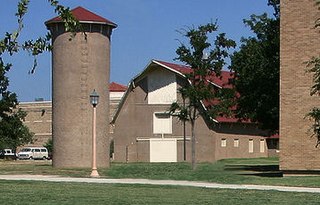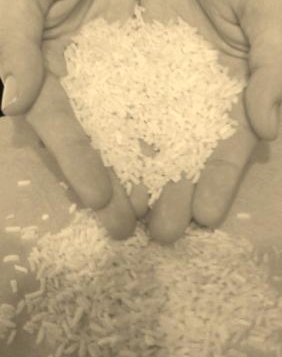
The Food and Agriculture Organization of the United Nations (FAO) is a specialized agency of the United Nations that leads international efforts to defeat hunger and improve nutrition and food security. Its Latin motto, fiat panis, translates to "let there be bread". It was founded on 16 October 1945.

The World Food Programme (WFP) is an international organization within the United Nations that provides food assistance worldwide. It is the world's largest humanitarian organization and the leading provider of school meals. Founded in 1961, WFP is headquartered in Rome and has offices in 80 countries. As of 2021, it supported over 128 million people across more than 120 countries and territories.

The United States Department of Agriculture (USDA) is an executive department of the United States federal government that aims to meet the needs of commercial farming and livestock food production, promotes agricultural trade and production, works to assure food safety, protects natural resources, fosters rural communities and works to end hunger in the United States and internationally. It is headed by the secretary of agriculture, who reports directly to the president of the United States and is a member of the president's Cabinet. The current secretary is Tom Vilsack, who has served since February 24, 2021.

Community-supported agriculture or cropsharing is a system that connects producers and consumers within the food system closer by allowing the consumer to subscribe to the harvest of a certain farm or group of farms. It is an alternative socioeconomic model of agriculture and food distribution that allows the producer and consumer to share the risks of farming. The model is a subcategory of civic agriculture that has an overarching goal of strengthening a sense of community through local markets.

Mercy Corps is a global non-governmental, humanitarian aid organization operating in transitional contexts that have undergone, or have been undergoing, various forms of economic, environmental, social and political instabilities. The organization claims to have assisted more than 220 million people survive humanitarian conflicts, seek improvements in livelihoods, and deliver durable development to their communities.
Agribusiness is the industry, enterprises, and the field of study of value chains in agriculture and in the bio-economy, in which case it is also called bio-business or bio-enterprise. The primary goal of agribusiness is to maximize profit while satisfying the needs of consumers for products related to natural resources such as biotechnology, farms, food, forestry, fisheries, fuel, and fiber.
Agricultural extension is the application of scientific research and new knowledge to agricultural practices through farmer education. The field of 'extension' now encompasses a wider range of communication and learning activities organized for rural people by educators from different disciplines, including agriculture, agricultural marketing, health, and business studies.

World Food Day is an international day celebrated every year worldwide on October 16 to commemorate the date of the founding of the United Nations Food and Agriculture Organization in 1945. The day is celebrated widely by many other organizations concerned with hunger and food security, including the World Food Programme, the World Health Organization and the International Fund for Agricultural Development. WFP received the Nobel Prize in Peace for 2020 for their efforts to combat hunger, contribute to peace in conflict areas, and for playing a leading role in stopping the use of hunger in the form of a weapon for war and conflict.
The Commodity Credit Corporation (CCC) is a wholly owned United States government corporation that was created in 1933 to "stabilize, support, and protect farm income and prices". The CCC is authorized to buy, sell, lend, make payments, and engage in other activities for the purpose of increasing production, stabilizing prices, assuring adequate supplies, and facilitating the efficient marketing of agricultural commodities.

Agricultural education is the systematic and organized teaching, instruction and training available to students, farmers or individuals interested in the science, business and technology of agriculture as well as the management of land, environment and natural resources/

Food policy is the area of public policy concerning how food is produced, processed, distributed, purchased, or provided. Food policies are designed to influence the operation of the food and agriculture system balanced with ensuring human health needs. This often includes decision-making around production and processing techniques, marketing, availability, utilization, and consumption of food, in the interest of meeting or furthering social objectives. Food policy can be promulgated on any level, from local to global, and by a government agency, business, or organization. Food policymakers engage in activities such as regulation of food-related industries, establishing eligibility standards for food assistance programs for the poor, ensuring safety of the food supply, food labeling, and even the qualifications of a product to be considered organic.
In different administrative and organizational forms, the Food for Peace program of the United States has provided food assistance around the world for more than 60 years. Approximately 3 billion people in 150 countries have benefited directly from U.S. food assistance. The Bureau for Humanitarian Assistance within the United States Agency for International Development (USAID) is the U.S. Government's largest provider of overseas food assistance. The food assistance programming is funded primarily through the Food for Peace Act. The Bureau for Humanitarian Assistance also receives International Disaster Assistance Funds through the Foreign Assistance Act (FAA) that can be used in emergency settings.
Information and communication technology in agriculture, also known as e-agriculture, focuses on the enhancement of agricultural and rural development through improved information and communication processes. More specifically, e-agriculture involves the conceptualization, design, development, evaluation and application of innovative ways to use information and communication technologies (ICTs) in the rural domain, with a primary focus on agriculture. ICT includes devices, networks, mobiles, services and applications; these range from innovative Internet-era technologies and sensors to other pre-existing aids such as fixed telephones, televisions, radios and satellites. Provisions of standards, norms, methodologies, and tools as well as development of individual and institutional capacities, and policy support are all key components of e-agriculture.
Civic agriculture is the trend towards locally based agriculture and food production that is tightly linked to a community's social and economic development. It is also connected to the citizenship and environmentalism within a community. Civic agriculture is geared towards meeting consumer demands in addition to boosting the local economy in the process through jobs, farm to food production efforts, and community sustainability. The term was first coined by Thomas Lyson, professor of sociology at Cornell, to represent an alternative means of sustainability for rural agricultural communities in the era of industrialized agriculture. Civic agriculture is geared towards fostering a self sustainable local economy through an integral community structure in which the entire community is in some part responsible for their food production. Civic agriculture can provide a variety of benefits to a community such as cleaner water, fresher foods, and a better connection between farmers and the community. However, there are also critiques that are concerned with the way in which civic agriculture promotes community responsibility and possibly creates a false sense of citizenship. The intent of civic agricultural practices is to move away from the industrialized sector and into a localized community effort.

Agricultural marketing covers the services involved in moving an agricultural product from the farm to the consumer. These services involve the planning, organizing, directing and handling of agricultural produce in such a way as to satisfy farmers, intermediaries and consumers. Numerous interconnected activities are involved in doing this, such as planning production, growing and harvesting, grading, packing and packaging, transport, storage, agro- and food processing, provision of market information, distribution, advertising and sale. Effectively, the term encompasses the entire range of supply chain operations for agricultural products, whether conducted through ad hoc sales or through a more integrated chain, such as one involving contract farming.
The Farmer-to-Farmer (F2F) Program is funded by the US Agency for International Development through the US Farm Bill to assist developing countries, middle-income countries, and emerging markets around the world to increase farm production and incomes. It promotes sustainable economic growth, food security and agricultural development worldwide. Volunteer technical assistance from US farmers, agribusinesses, cooperatives, and universities helps developing countries improve productivity, access new markets, build local capacity, combat climate change and conserve environmental and natural resources. Farmer-to-Farmer also aims to increase the American public's understanding of international development issues and programs and international understanding of the U.S. and U.S. development programs.

Farm Radio International, or Radios Rurales Internationales, is a Canadian non-profit organization that was founded in 1979 by CBC Radio broadcaster George Atkins. The organization is headquartered in Ottawa, Ontario and works with radio broadcasters to improve food security and agricultural methods for small-scale farmers and rural communities in African countries.
Purchase for Progress (P4P) is an initiative of the United Nations World Food Programme (WFP), involving over 500 partnerships, including Bill & Melinda Gates Foundation, the Howard G. Buffett Foundation, FAO, ACDI/VOCA, TechnoServe and others. Launched in September 2008 as a five-year pilot, P4P sought to explore programming and procurement modalities with the greatest potential to stimulate agricultural and market development in ways that maximized benefits to smallholder farmers. The program, largely developed by the eleventh Executive Director of the WFP, Josette Sheeran, arose as the WFP desired to purchase food in a way that was part of the "solution to hunger". These efforts are aligned with recommendations issued by the UN Committee on Economic, Social and Cultural Rights that call for an establishment of programs in support of socially vulnerable groups. and to the Zero Hunger Challenge launched by the UN Secretary General Ban Ki-moon. Special UN Reporter 2012–2014, Olivier De Schutter, claimed that public procurement systems favour economically-strong bidders, thus excluding smallholder farmers. His conclusion was that public procurement schemes supportive of smallholders could have "powerful impacts on the reduction of rural poverty." P4P is built upon this very principle as it enables low-income farmers to supply food to the WFP's operations. Eventually the transaction can be regulated by a forward contract, with the farmer agreeing in selling in the future a certain amount of output at a fixed price. Essentially, the P4P program aims to create a wide and sophisticate market for commodities in developing countries.

The Farmers' Market Nutrition Program (FMNP) is a federal assistance program in the United States associated with the Special Supplemental Nutrition Program for Women, Infants and Children that provides fresh, unprepared, locally grown fruits and vegetables and nutrition education to WIC participants. Women, infants and children that have been certified to receive WIC program benefits or who are on a waiting list for WIC certification are eligible to participate in the FMNP.

The Cooperative State Research, Education, and Extension Service (CSREES) was an extension agency within the U.S. Department of Agriculture (USDA), part of the executive branch of the federal government. The 1994 Department Reorganization Act, passed by Congress, created CSREES by combining the former Cooperative State Research Service and the Extension Service into a single agency.











